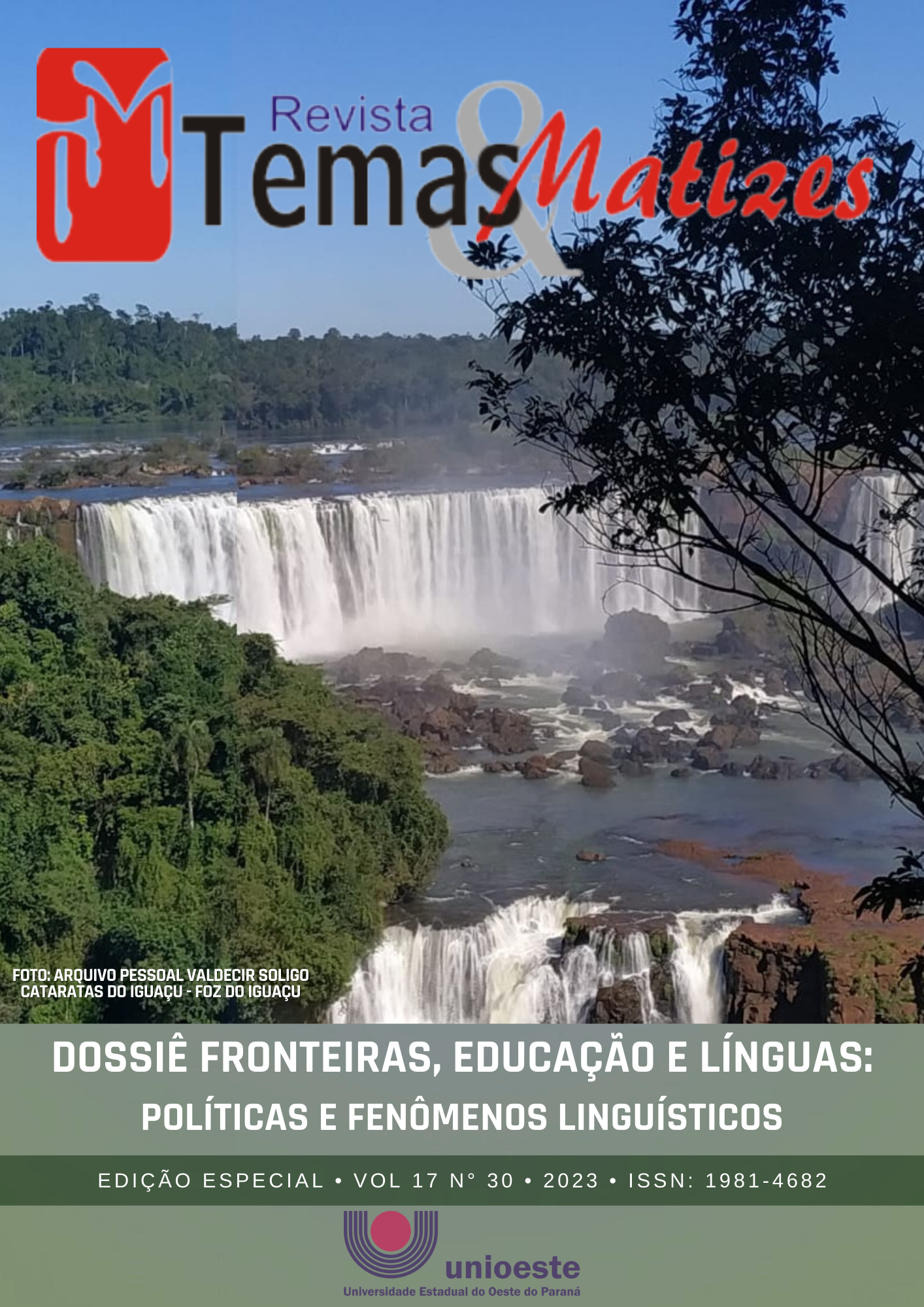PROJECT FOR BILINGUAL AND INTERCULTURAL BORDER SCHOOLS: AN EXPERIENCE WITH SCHOOLS IN PORTUGAL AND SPAIN
DOI:
https://doi.org/10.48075/rtm.v17i29.31840Keywords:
Bilingual and Intercultural Border Schools, The Raia, Practices and Cultural Events, Cross-border CooperationAbstract
This paper presents the result of a “reading” of the events and practices involved in the first edition of the Project for Bilingual and Intercultural Border Schools, designed to train primary school educators in Portugal and Spain, which took place from 2021 to 2022. In this context, “reading” means the process of making particular meanings of the studied group visible. Among the project's axes of action and goals, we found the promotion of cooperation between Iberian countries, specifically on their borders in educational projects, as well as the production of educational resources in collaborative networks. In the first edition, the project involved 16 Portuguese and Spanish schools, educational institutions from both countries, the coordination of the University of Aveiro in Portugal and the Universidad Complutense de Madrid in Spain, and a partnership with the Organization of Ibero-American States (OEI). To facilitate this analysis, we used a methodology with an ethnographic bias, based on the search for rich points in order to “read” the meanings constructed by the subjects themselves, historically and spatially contextualized. Along the way, we went through Raia's territorial and cultural issues, through the history of cross-border cooperation and the meeting of languages and cultures, as well as a summary of some activities based on the perspective of bilingualism and interculturality. The set of PEBIF events and practices indicates a culture that values interculturality and the linguistic diversity, as the project name suggests. The use of the research-action methodology gives rise to reflections on different practices and events, in a productive dialogue that results in the recognition and appreciation of linguistic and cultural diversity.
References
Agar, M. (2006). An Ethnography By Any Other Name . Forum Qualitative Sozialforschung Forum: Qualitative Social Research, 7(4). https://doi.org/10.17169/fqs-7.4.177
Antunes Lopes, M. A. (2020). Refugiados espanhóis em Portugal (1936-1938): O caso de Elvas. O Pelourinho: Boletín de Relaciones transfronterizas, 24 (2ª época), 129-154.
Antunes Simões, M. D. (2008). Fronteras estatales y relaciones sociales en la frontera hispano-portuguesa. El caso de Barrancos y Oliva de la Frontera. Gazeta de Antropología, 24(2), 01-12. http://hdl.handle.net/10481/6965.
Baptista, D. E. P. C. (s.d.). Caminhos do contrabando. Disponível em https://www.cei.pt/pdfdocs/Caminhos%20do%20Contrabando.pdf
Campesino Fernández, A. J., & López Trigal, L. (2017). Prólogo. Polígonos. Revista De Geografía, (29), 5–9. https://doi.org/10.18002/pol.v0i29.5198
Castro, F. de (1934 [2015]). Terra Fria (16ª). Cavalo de Ferro.
Direção-Geral do Ordenamento do Território e Desenvolvimento Urbano (DGOTDU). (2011). Glossário do Desenvolvimento Territorial. Conferência Europeia dos Ministros responsáveis pelo Ordenamento do Território do Conselho da Europa (CEMAT). Lisboa, DGOTDU. Disponível em https://rm.coe.int/16806f7d5d
González Jiménez, M. (1986). Conflictos fronterizos en la Sierra de Aroche: el pleito de Barrancos (1493). Huelva En Su Historia, 1. Disponível em http://www.uhu.es/publicaciones/ojs/index.php/huelvahistoria/article/view/757
Green, J. L.; Dixon, C. N.; Zaharlick, A. (2005). A etnografia como uma lógica de investigação. Educação em Revista, (42), 13-79. Universidade Federal de Minas Gerais.
I Congreso Interiberoamericano de Educación. Em: Mundo Hispánico, 3(31), 1950. https://bibliotecadigital.aecid.es/bibliodig/es/catalogo_imagenes/grupo.do?path=1028226.
Latorre, A. (2005). La investigación-acción: conocer y cambiar la práctica educativa(3ª). Editorial Graó.
Medina-García, E. (2021). La cooperación transfronteriza entre España y Portugal en perspectiva. Ciudad y Territorio Estudios Territoriales, 53 (209), 633-646. https://doi.org/10.37230/CyTET.2021.209.02
Moya, M. (01 de junio de 2023). Integración, accesibilidad y servicios de proximidad, claves para una frontera ibérica más social. EuroEFE:Euroactiv. https://euroefe.euractiv.es/section/historias-ibericas-de-cohesion/news/integracion-accesibilidad-y-servicios-de-proximidad-claves-para-una-frontera-iberica-mas-social/
OEI. Estatutos. https://oei.int/pt/publicacoes/estatutos-de-la-oei. Consulta: 24 de maio de 2023.
Portugal (2017). Declaração Conjunta da XXIX Cimeira Luso-Espanhola. https://www.portugal.gov.pt/pt/gc21/comunicacao/documento?i=20170530-pm-cimeira-iberica-decl-final. Consulta: 31 de maio de 2023.
Portugal (2018). Declaração Conjunta da XXX Cimeira Luso-Espanhola. https://www.portugal.gov.pt/pt/gc21/comunicacao/documento?i=declaracao-conjunta-da-30-cimeira-luso-espanhola. Consulta: 01 de junho de 2023.
Portugal (2023a). Assinado memorando «Projeto Escolas de Fronteira». https://www.portugal.gov.pt/pt/gc23/comunicacao/noticia?i=assinado-memorando-projeto-escolas-de-fronteira. Consulta: 31 de maio de 2023.
Portugal (2023b). Declaração Conjunta da XXXIV Cimeira Luso-Espanhola. https://www.portugal.gov.pt/pt/gc23/comunicacao/comunicado?i=declaracao-conjunta-da-xxxiv-cimeira-luso-espanhola. Consulta: 31 de maio de 2023.
Schön, D. A. (1998). El profesional reflexivo. Barcelona: Paidós.
Tratado de Amizade e Cooperação entre Portugal e Espanha. 22 de novembro de 1977. Disponível em https://gddc.ministeriopublico.pt/sites/default/files/documentos/instrumentos/rar59A-1978.pdf. Acesso em: 17 de junho de 2023.
Downloads
Published
How to Cite
Issue
Section
License

This work is licensed under a Creative Commons Attribution-NonCommercial-ShareAlike 4.0 International License.
Aviso de Direito Autoral Creative Commons
Política para Periódicos de Acesso Livre
Autores que publicam nesta revista concordam com os seguintes termos:
1. Autores mantém os direitos autorais e concedem à revista o direito de primeira publicação, com o trabalho simultaneamente licenciado sob a Licença Creative Commons Attribution que permite o compartilhamento do trabalho com reconhecimento da autoria e publicação inicial nesta revista.2. Autores têm autorização para assumir contratos adicionais separadamente, para distribuição não-exclusiva da versão do trabalho publicada nesta revista (ex.: publicar em repositório institucional ou como capítulo de livro), com reconhecimento de autoria e publicação inicial nesta revista.
3. Autores têm permissão e são estimulados a publicar e distribuir seu trabalho online (ex.: em repositórios institucionais ou na sua página pessoal) a qualquer ponto antes ou durante o processo editorial, já que isso pode gerar alterações produtivas, bem como aumentar o impacto e a citação do trabalho publicado (Veja O Efeito do Acesso Livre).
Licença Creative Commons
Esta obra está licenciada com uma Licença Creative Commons Atribuição-NãoComercial-CompartilhaIgual 4.0 Internacional, o que permite compartilhar, copiar, distribuir, exibir, reproduzir, a totalidade ou partes desde que não tenha objetivo comercial e sejam citados os autores e a fonte.


